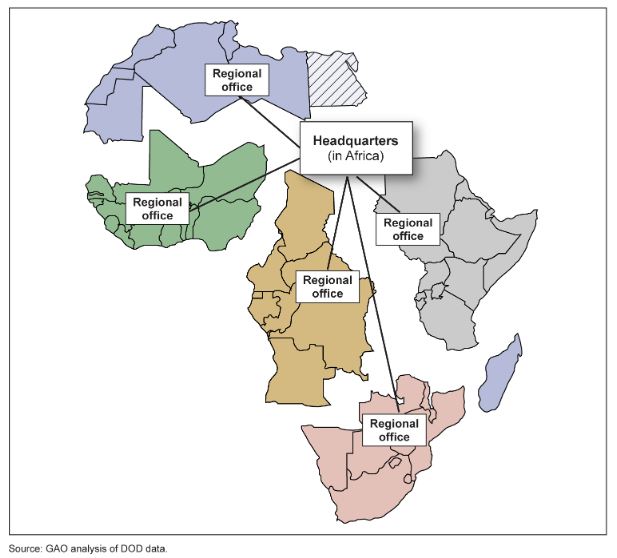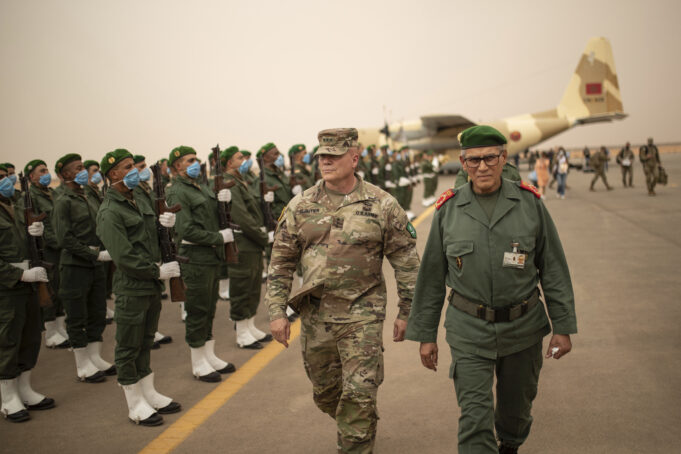The senior military leader of the United States Africa Command (AFRICOM) recently expressed fears of an increasing danger of terrorist groups active throughout the continent. But the reality behind why the U.S. is moving in the Motherland is not linked solely to fear of terrorists.
General Stephen J. Townsend expressed concerns to journalists at the completion of U.S. led war exercises in Northwest Africa with troops from America, Europe and Africa on June 18. The “African Lion” military exercises involved 7,000 troops from Morocco, Tunisia, Senegal, Italy, The Netherlands, and Britain and observers from Egypt, Qatar, Niger, and Mali. The air, land and sea drills were nearly two weeks in Morocco, Tunisia, and Senegal.
“I am concerned about the security situation across a band of Africa,” Gen. Townsend told reporters.
He was referring to the vast territory from the Sahel region in the west to the Horn of Africa in the east, noting deadly attacks by Al-Qaida, Islamic State-linked fighters and Al-Shabab in Somalia. “All of them are on the march,” he said.
The AFRICOM head also said African neighbor states are helping governments deal with the threat. And, he added, “all of that does not seem to be sufficient enough to stop” what he called the “wildfire of terrorism that’s sweeping that region.”

Looking at Gen. Townsend’s assessment, no doubt extremism exists in Africa. But observers note when America raises the issue of terror groups on the continent, conspicuously absent is any mention of the roots of so-called terrorism.
“The historical context is what they always need to leave out,” said Netfa Freeman of Pan African Community Action, a member organization of the Black Alliance for Peace.
Talking about the roots of terrorism, he said, the U.S. government and other Western forces in Africa over-militarizing the continent would have to admit their complicity in the causes and origin of these extremist groups.
“Many of them come out of … a reactionary response to neocolonialism and the inability of the global order of capitalism and imperialism to allow the countries in Africa to gain a semblance of stability and self-determination,” said Mr. Freeman.
An example Mr. Freeman gave was how Al-Shabab in Somalia resulted from anti-intervention struggles and fights against a coalition of Mogadishu warlords America covertly supported.
Mr. Freeman said Gen. Townsend’s comments on Africa should be seen through a similar lens as rising crime and violence in America’s urban communities. “And these reasons are the desperation and the frustrations and the different things that come out of living under a system that doesn’t care about people,” he stated.
When people rise to address the grievance, city officials and the government says, “we need to increase police presence” as AFRICOM leaders advocate militarization. Terrorism is used to justify America’s military presence in Africa.
Looking at the root cause also points the finger at Washington’s history of supporting terrorist groups in Iraq, Syria, Afghanistan, and Libya as opposition forces to undermine America’s geopolitical foes in these lands. Especially in Libya where NATO destroyed the government in 2011 and supported the most reactionary elements in Benghazi to overthrow and kill Muammar Gadhafi.
“That actually allowed those elements to raid the armories … heavily stocked and best arms … we see them spread across the whole of Africa,” said Mr. Freeman.
The aftermath left Africa vulnerable to extremist driven insurgencies unleashed by the U.S./NATO destruction of Mr. Gadhafi, whose leadership kept them in check.
At the time the Honorable Minister Louis Farrakhan of the U.S.-based Nation of Islam warned the dire consequence of their actions would be mayhem, devastation, and conflict in Africa, which is now being witnessed a decade later.
“Your joy will be short lived for what you have done America, England, France, Italy, Canada,” warned Minister Farrakhan in a WVON radio interview in October 2011.
“What just happened has let the dogs of destruction out,” Minister Farrakhan said, predicting the future now current fate of Africa.
Bloodshed gripping the desert Sahel of northern and western Africa and other parts could be examined in the context of the geo-strategic importance of Africa for Western nations and the struggle to remain relevant powers in this century and beyond.
The demise of Col. Gadhafi, the reigniting of historical struggles between Berber ethnic groups and several governments across Africa, coupled with arms and training must also be considered.
Then there are economic challenges and dissatisfaction threatening social implosion in Europe and America while Africa is seen by Western imperialists as the last frontier for their survival. Superpower status depends on control of Africa’s strategic resources in the day of Western world decline.
Going back several U.S. administrations, America has courted African governments into signing on to U.S. influence and meddling under the public face of fighting “Al-Qaeda in the Maghreb” or any reasonable facsimile of it.
The trouble with extremists in Africa also exposes the weakness of the African Union to respond to foreign meddling in African affairs. Washington has now prioritized AFRICOM and the U.S. presence in Africa at a time when resistance from African leadership is milquetoast and cautious.
Gen. Townsend’s observation also comes as the U.S. lags behind the Peoples’ Republic of China in the great power competition for African influence during Joe Biden’s so-called “America is back” declaration on the world stage. Africa watchers say the claim means dubious U.S. policies are back in business.
Business is warfare and since the years of yore and European scrambles in Africa for her treasures of natural resource wealth, Africa is vital for industrialized powers’ survival.
The continent of 1.2 billion people is a theater for big power competition and potential war. In the fray China has been outstepping America—the world’s number one economy—and European competitors alike.
With the militarization of Africa, with until recently America as the world’s top arms dealer and strongest military, the big power competition has become increasingly gangster, say analysts. Some say the foreign presence is problematic, even at the invitation of African leaders in “cooperation” agreements between the African Union and the North Atlantic Treaty Organization.
The principal areas of cooperation are military operational support, training support and structural assistance. On the surface such a relationship is practical, however, it can leave the light on for entry into African internal affairs by NATO member states as what happened in Libya.
America also sees China as a possible military threat. Gen. Townsend told Associated Press in May that China has been pitching African governments as potential locations for a large navy port capable of hosting submarines or aircraft carriers on Africa’s western coast.
If successful it would allow China to station warships for its expanding navy in the Atlantic as well as Pacific oceans.
“They’re looking for a place where they can rearm and repair warships. That becomes militarily useful in conflict,” said Gen. Townsend.
China has had a military presence in the small east African nation of Djibouti since 2017 which American military officials describe as being “right outside our gates” at the U.S. base at Camp Lemonnier, the home of AFRICOM located next to Djibouti.
Other U.S. military and intelligence officials have warned of China’s efforts to supplant the U.S. on the world stage. They note Beijing’s $60 billion in infrastructure and development funding this decade and expanding the number of embassies on the continent to 52, three more than America has.
Further, the militarization of the continent is big business because the more plausible a threat, the more arms and technology of war can be sold.
“One of the things about militarism, it’s an industrial complex, a money maker, the only thing they (the U.S.) have left is militarization,” said Mr. Freeman.
—Brian E. Muhammad, staff writer













